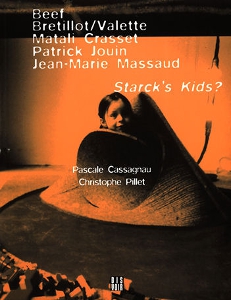Philippe Starck's legacy through the portraits of his former apprentices.
As Philippe Starck gleefully clads himself in the guru's mantle, questions concerning the teaching of
design and the place of the designer in the evolving relations with production become ever more acute. At the same time, there is a noticeable tendency amongst young designers to replace products by services. In this context, it would seem worthwhile to take a closer look at Philippe Starck's teaching along with the revamped concept of the workshop by examining the subsequent development of some of the master's former assistants.
Pascale Cassagnau is a PhD in Art History and works as an art critic. She is in charge of audiovisual and new media contents at the CNAP (Ministry for Culture). She has been writing articles for
Art Press for numerous years. She has written texts on
Chris Burden, James Coleman,
John Baldessari,
Pierre Huyghe,
Dominique Gonzalez-Foerster and
Matthieu Laurette in particular. Her research work is on new practices in cinema, especially the way they interact with contemporary creation. Her essay
Future Amnesia -Enquête sur un troisième cinéma. (Ed.Isthme) documents those new film forms, which are halfway between fictions and documentaries.
Un Pays Supplémentaire (Ed. Ecole des beaux-arts de Paris) deals with the role of contemporary creation within the architecture of the media. Pascale Cassagnau is the author or the first ebook published by Les presses du réel:
Intempestif, Indépendant, Fragile – Marguerite Duras et le Cinéma d'art contemporain.
Christophe Pillet (born 1959, Montargis, France. Lives and works in Paris) is a French designer who has won international acclaim for the spectrum and quality of his creations. Architecture, objects, furniture, art direction: his signature is invariably associated with the finest brands and projects of ever-increasing weight and prestige.

